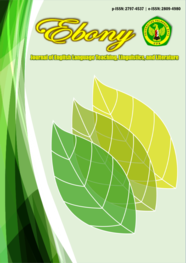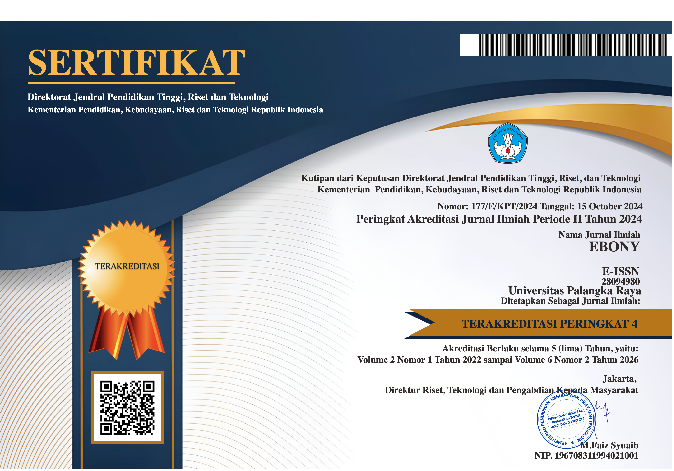Teachers’ Perspectives and Experiences in Higher Education Vocabulary Instruction
DOI:
https://doi.org/10.37304/ebony.v5i1.17969Keywords:
Experience, Instruction, Perspective, Vocabulary Learning Strategies (VLS)Abstract
The selection of vocabulary learning strategies (VLS) is a pivotal action in the English teaching and learning process. This study aimed to explore what teachers perceive and experience in vocabulary instruction in higher education. A narrative approach was employed in this study. Using the purposive sampling technique under the criteria of a minimum of four years of experience as permanent English teachers and limited the area of study only to one of religious higher education in Central Kalimantan, five English teachers were enrolled as participants. Unstructured, open-ended interviews were used as the instrument for collecting the primary data. After collecting the stories, the data were reported and validated using triangulation. The results revealed that teachers believed that using a variety of learning strategies to engage learners to be interested in vocabulary instruction was useful. Then, the challenges both external and internal factors faced by teachers in vocabulary instruction could be handled by employing the strategies that fit the students’ characteristics, such as learning vocabulary through songs, games, and social media platforms such as TikTok, YouTube, Instagram, and so forth. Therefore, it can be drawn to the conclusion that teachers must always be creative and innovative in action by utilizing technology advancement. Besides, the use of differentiated instruction approach could be better employed by teachers for solutions to problems, particularly in facilitating diverse student characteristics. Next, the use of various modes of learning or multimodal sources can also help students in higher education to get very meaningful vocabulary learning.
Downloads
References
Akramy, S. A., Noori, A. Q., Orfan, S. N., & Hashemi, A. (2022). Effective techniques of teaching vocabulary in Afghan EFL classrooms. Asian-Pacific Journal of Second and Foreign Language Education. https://doi.org/10.1186/s40862-022-00151-8
Ali Mansoor, A. A., Mohammed, O. S. M., Ahmed, H. R., Munasser Awadh, A. N., Abdulfatah, H. M., & Sheikh, E. Y. (2023). English language teaching through a short story : A technique for improving students ’ vocabulary retrieving English language teaching through a short story : A technique for improving students ’ vocabulary retrieving. Cogent Education, 10(1). https://doi.org/10.1080/2331186X.2022.2161221
Asyiah, D. N. (2017). The vocabulary teaching and vocabulary learning: Perception, strategies, and influences on students’ vocabulary mastery. Jurnal Bahasa Lingua Scientia, 9(2), 293–318. https://doi.org/10.21274/ls.2017.9.2.133-158
Ayaz, M., & Faheem, M. (2016). The role of social media in development of English language vocabulary at university level. International Journal of Academic Research in Business and Social Sciences, 6(12). https://doi.org/10.6007/IJARBSS/v6-i11/2444
Bai, Z. (2018). An Analysis of English Vocabulary Learning Strategies. Journal of Language Teaching and Research, 9(4), 849–855.
Baumann, J. F., Kame’enui, E. J., & Ash, G. (2003). Research on vocabulary instruction: Voltaire redux. In Handbook of research on teaching the English Language Arts (2nd ed.). (In J. Fllo). Lawrence Erlbaum.
Beck, I. L., McKeown, M. G., & Kucan, L. (2002). Bringing words to life: Robust vocabulary instruction. Guilford Press.
Bulusan, F., Antonio, R. B., & Gabriel-Dumaga, S. (2019). Correct me if I’m wrong: Exploring the attitudes and preferences of ESL learners on oral corrective feedback in a multicultural milieu. Asian ESP Journal, 15(2), 83–104.
Chall, J.s. & Jacobs, V. A. (. (2003). Poor children’s fourth-grade slump. American Federation of Teachers.
Creswell, J. W. (2012). Educational research: Planning, conducting and evaluating quantitative and qualitative research (4th ed.). Pearson.
Djamdjuri, D. S., Suseno, M., Tajuddin, S., Lustyantie, N., & Chaeruman, U. A. (2021). Multimodal Approach in Online EFL Class Using Islamic Learning Materials: Students’ Perspective. International Journal of Language Education, 5(4), 337–355. https://doi.org/10.26858/ijole.v5i4.22495
Fatimah, F., & Masduqi, H. (2021). Learning vocabulary through games: A critical review. Journal of Education of English as Foreign Language, 4(2).
Fitria, T. N. (2023). Understanding Basic Literacy and Information Literacy for Primary Students. Journal of Contemporary Issue in Elementary Education (JCIEE), 1(2), 103–121.
Ghalebi, R., Sadighi, F., & Bagheri, M. S. (2020). Vocabulary learning strategies: A comparative study of EFL learners vocabulary learning strategies. Cogent Psychology, 7(1). https://doi.org/10.1080/23311908.2020.1824306
Ghalebi, R., Sadighi, F., & Bagheri, M. S. (2021). A study of vocabulary learning strategies among high and low iranian english vocabulary learners A study of vocabulary learning strategies among high and low iranian english vocabulary learners. Cogent Education, 8(1). https://doi.org/10.1080/2331186X.2020.1834933
Hellwig, A. F. J., Jones, P. T., Matruglio, E., & Georgiou, H. (2022). Multimodality and English for Special Purposes: Signification and Transduction in Architecture and Civil Engineering Models. Frontiers in Communication, 7(July), 1–16. https://doi.org/10.3389/fcomm.2022.901719
Kayaaltı, M. (2018). A literature review on the impact of online games in learning vocabulary. International Journal of Scientific and Research Publications, 8(2), 312–317.
Khalifa, S. H. (2015). Effect of vocabulary learning strategies on academic achievements of pre-university libyan efl learners. 6(1), 378–396.
Kholis, A., & Azmi, U. (2023). A Need Analysis on Developing English Interactive Multimodal E-Book Oriented to 21st Century Skills. Elsya : Journal of English Language Studies, 5(1), 85–106. https://doi.org/10.31849/elsya.v5i1.11804
Kustini, S., Suherdi, D., & Musthafa, B. (2020). Beyond traditional literacies: A multimodal-based instruction to fostering student digital literacy learning. Jurnal Pendidikan Bahasa Dan Sastra, 20(1), 37–47. https://doi.org/10.17509/bs_jpbsp.v20i1.25969
Mardali, J., & Siyyari, M. (2019). English teachers ’ beliefs and practices in teaching vocabulary : The case of teaching experience English teachers ’ beliefs and practices in teaching vocabulary : The case of teaching experience. Cogent Education, 6(1). https://doi.org/10.1080/2331186X.2019.1686812
Martinez, M. I., Díaz Lara, G., & Whitney, C. R. (2024). The role of teacher beliefs in teacher learning and practice: implications for meeting the needs of English learners/emergent bilinguals. Language and Education, 0(0), 1–18. https://doi.org/10.1080/09500782.2024.2362305
National Reading Panel. (2000). Teaching children to read: An evidence-based assessment of scientific research literature on reading and its implications for reading instruction.
Phillips, D., Foote, C., & Harper, L. (2008). Strategies for effective vocabulary instruction. t, 45(2), 62. Reading Improvement, 45(2), 62.
Phisutthangkoon, K., & Panich, M. (2016). Effectiveness of english song activities on vocabulary learning and retention. In The European Conference on Language Learning.
Rahmani, S. (2023). Vocabulary learning beliefs and strategies of afghan efl undergraduate learners. Cogent Education, 10(1). https://doi.org/10.1080/2331186X.2023.2194227
Rokhyati, U. (2013). Teaching english at higher education in indonesia: searching for usefulness. SELT Proceeding, 235–240.
Sedita, J. (2005). Effective vocabulary instruction. “Insights on Learning Disabilities, 2(1), 33–45.
Septiana, I. (2018). The Challenges of Teaching for English Specific Purposes in Higher Education. Jurnal Ilmiah Bina Bahasa, 11(1), 22–31. http://journal.binadarma.ac.id/index.php/binabahasa/article/view/296
Triwardani, H. R. (2022). Building vocabulary through song as effective method in learning English. Lingua, 18(1), 98–111.
Workie, M. B., & Feleke, K. E. (2020). Strategies of Vocabulary Instruction in English Language Teaching: A Literature Review. International Journal of English Literature and Culture, 8(5), 134–142. https://doi.org/10.14662/IJELC2020.105
Zainal, Z., & Rahmat, N. H. (2020). Social media and its influence on vocabulary and language learning: A case study. European Journal of Education Studies, 7(11).
Downloads
Published
How to Cite
Issue
Section
License
Copyright (c) 2025 Ni Nyoman Tantri, Ni Nyoman Padmadewi, Luh Putu Artini

This work is licensed under a Creative Commons Attribution 4.0 International License.











